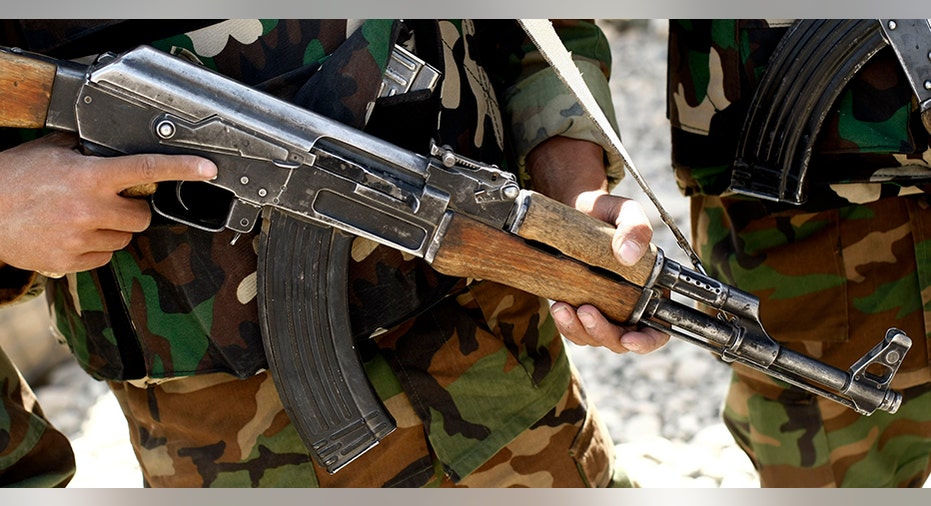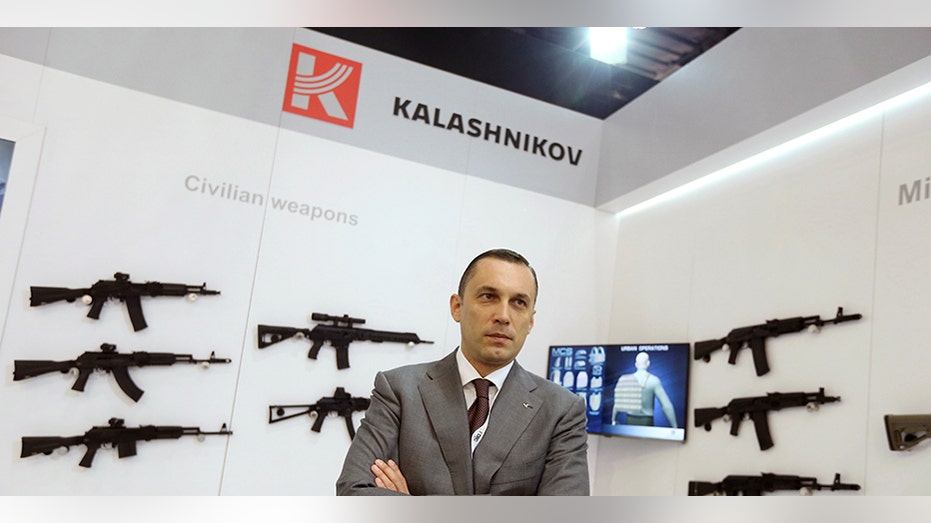Russian arms maker finds success even after U.S. sanctions

IZHEVSK, Russia – Russian arms manufacturer Kalashnikov Concern once had America in its sights: The iconic rifle designer aimed to open a U.S. production facility to meet demand in the world's largest civilian gun market.
Sanctions imposed by the U.S. against the company in 2014 ended those plans. But after a quick pivot, sales are booming as the company looks to governments in Asia, Africa and elsewhere that want to upgrade their militaries' equipment at an affordable price and seal closer ties with the Kremlin.
"The sanctions turned a civilian-focused company into a military one," said Alexey Krivoruchko, chief executive of Kalashnikov Concern.
Revenues at Kalashnikov more than doubled last year to the equivalent of $300 million and are forecast to increase a further twofold this year.
Kalashnikov no longer produces its renowned AK-47 -- the rugged assault rifle that became the symbol of the global reach of the Soviet Union's arms industry -- but executives and analysts say its latest assault rifles retain the same selling points: simplicity and reliability even in the most unforgiving environments, and at a cheaper price than competitors.The company, which also offers a variety of hunting and sporting weapons, is expanding: it recently acquired a drone manufacturer and a shipbuilder.
The company's turnaround represents a rare bright spot in Russia's stagnant economy, which remains dominated by the state a quarter-century after the fall of the Soviet Union. Over a decade and a half in power, Russian President Vladimir Putin has promoted a brand of state-led capitalism that has strengthened the Kremlin's sway over key sectors of the economy.

In a first for Russia's tightly controlled arms industry, Kalashnikov was revived by a partnership of state and private investors that invested around 12 billion rubles over the last three years.
Five years ago, the factory in Izhevsk was all but shot. Creditors were circling; orders had dried up; workers toiled on Soviet-era machines under a leaking roof.
The investors installed new managers who overhauled equipment and working practices, increasing staff to 7,000 from 4,000 and are hiring hundreds more to keep production going around the clock to meet demand.
"Processes had degraded: There was old technology, old equipment, and poor results," said Dmitry Tarasov, managing director of Kalashnikov Concern. "New machines, new processes appeared; structures were simplified; we digitized, we cut down on paper bureaucracy."
The owners of Kalashnikov -- Mr. Krivoruchko and two other businessmen, along with state-holding company Rostec -- say their partnership gives the company the best of both worlds: private investment and management focused on efficiency and profit combined with the stability of a state interest in a strategic industry.
"It's surprising that they succeeded in turning the company around, given the situation it was in," said Ruslan Pukhov of Moscow-based defense think tank CAST.
The new investors at Kalashnikov also have benefited from ties to the Kremlin, analysts say.
Sergei Chemezov, the Rostec chief, has known Mr. Putin since he worked for the KGB in Dresden, Germany. Andrei Bokarev, one of Mr. Krivoruchko's partners, is a personal acquaintance of Defense Minister Sergei Shoigu, according to analysts. Mr. Putin in April called Mr. Bokarev a "diligent Russian entrepreneur."
Those benefits have come in the form of access to loans and acquisitions that have helped Kalashnikov move into drone production though the purchase of Zala, a Izhevsk-based maker of small unmanned aerial vehicles, analysts said. Mr. Putin has visited the plant twice in the last year and praised the turnaround, saying it was on a "completely new level." He presented Egyptian President Abdel Fattah Al Sisi with a Kalashnikov rifle in 2015.
The town of Izhevsk, which lies 600 miles east of Moscow, has been at the heart of the country's weapons industry since it started manufacturing arms for the war against Napoleon at the start of the 19th century. In the Soviet era, it pumped out millions of AK-47s, which became a symbol of revolutionary and insurgent movements around the globe.
The AK-47 also became emblematic of the deadly proliferation of small arms. After the Cold War, cheap Kalashnikov variants from Communist bloc countries flooded Third World markets. The easy-to-operate rifle became as popular in the hands of ragtag militias and child soldiers as among regular armies.
The breakup of the U.S.S.R. in 1991 also hit the Kalashnikov company hard, as state orders and investment halted. By the start of the 2010s, the company appeared headed toward insolvency; four CEOs had come and gone in as many years.
Rostec set about restructuring the business in 2011. A 49% stake in the heavily indebted company was sold to Mr. Krivoruchko and his partner in 2014 for 1.3 billion rubles, or $36 million, along with a pledge to invest millions more to turn the company around.
Mr. Krivoruchko, 41 years old, became chief executive and hired a new team of managers to oversee the overhaul of equipment and management.
They upgraded the factory, buying new machinery and cutting the length of the assembly line to increase efficiency. Thirty Soviet-era machines used to cut weapons parts were replaced by one laser cutting machine. Internal communications are now all digital: For example, problems with equipment are reported via computer terminals and smartphones rather than paper memos.
"In many companies, it was done decades ago," said Mr. Krivoruchko. "It's a basic thing."
But within months, the company's strategy was upended, when the U.S. Treasury Department sanctioned Kalashnkov in response to Russia's military interventions in Ukraine.
Kalashnikov shifted quickly, abandoning plans to open a production facility in the U.S., its main export market, and accelerating efforts to attract new clients in Asia, where governments are looking to arm their militaries with new equipment at prices lower than many Western competitors.
Mr. Krivoruchko is tight-lipped about client states, but analysts say Kalashnikov is looking at the possibility of establishing a production plant in India and the company is pushing its AK-103 for a tender in Pakistan.
Simplicity of design is a selling point for some militaries. But Russian arms analyst Mikhail Degtyarev said Kalashnikov remains a solid second-tier firm in the high-tech world of arms manufacturing.
"The technology works, but it's not cutting edge," he said, adding the company it competes in Southeast Asia and Africa with companies such as Poland's Fabryka Broni Lucznik-Radom, Belgium's FN Herstal and Germany's Heckler & Koch GmbH, all of which have offerings at a similar price and level of technology.



















